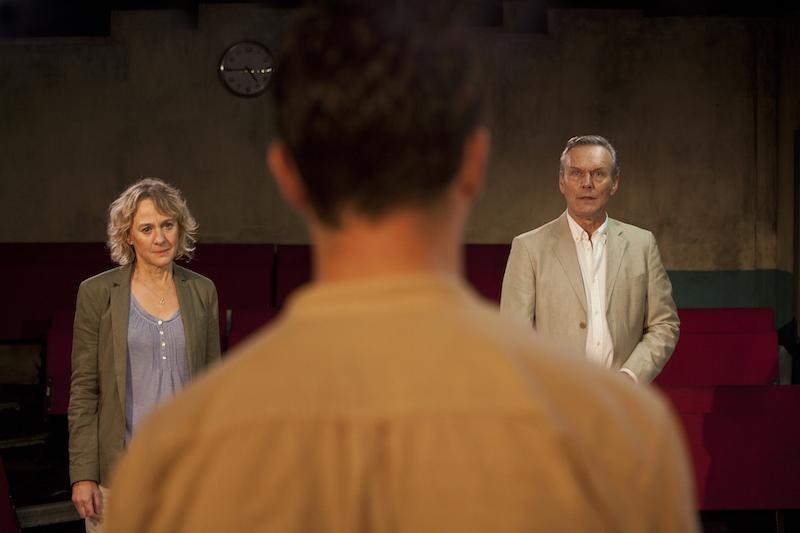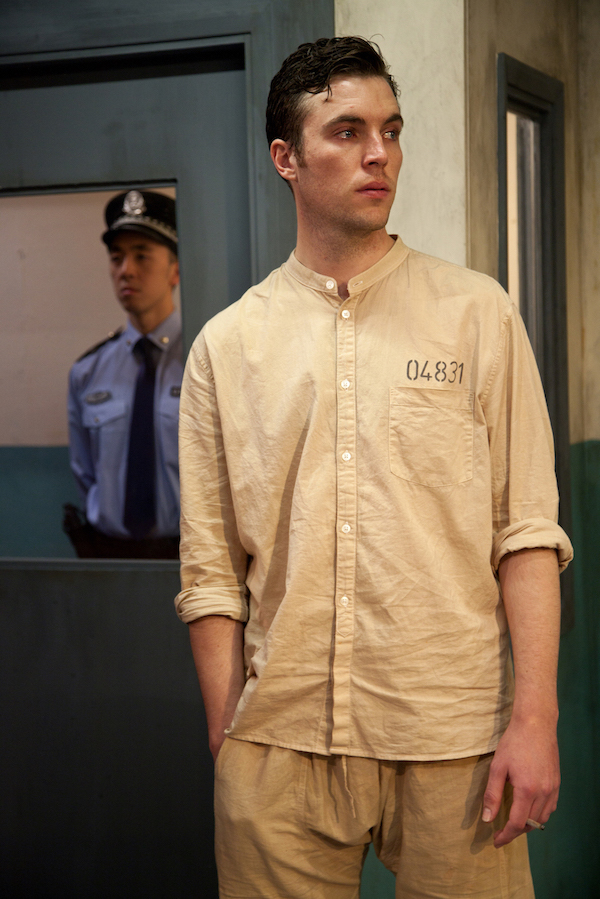Ticking, Trafalgar Studios | reviews, news & interviews
Ticking, Trafalgar Studios
Ticking, Trafalgar Studios
Death row unlocks family secrets in a grippingly played thriller

There’s nothing like a death to bring a family together. In Simon’s case, that death is his own – impending execution by firing squad in an unnamed Asian country, unless he can win a reprieve from the Prime Minister, President or Pope, “one of the Ps”. Confined space, buried secrets, and a race against the clock: in his stage debut, filmmaker Paul Andrew Williams is determined to make his audience sweat.
That you certainly will (and not just because of Trafalgar Studio 2’s appropriately cramped and furnace-like environs), although Williams’ methods of applying pressure tend towards the large, blunt object. That’s partly necessity, given the self-imposed constraints of his real-time play (which he also directs) – just 85 minutes to address a lifetime’s worth of familial issues, while also paying off a nail-biting thriller. But the speed therapy frequently jars, as when Simon plays marriage counsellor-cum-interrogator or hurriedly demands his visiting parents use his death to snap out of their conformist malaise and really live.
 Inelegant it may be, but it yields riveting results, thanks in no small part to a stirring trio of performances. Tom Hughes’s Simon (pictured right with Jackie Lam) is brattish, entitled, resentful, cruelly selfish in his determination to shift responsibility onto those who raised him, but very much a little boy lost. Throughout, Hughes’s body jerks and strains like a fish caught on the line, maintaining just enough sympathy to counter some of the nastier needling and eye-rolling adolescent melodrama. “Innocence died that night!” is one of his subtler proclamations. Yet the flashes of temper also make the accusation against him – stabbing a prostitute to death – disturbingly plausible.
Inelegant it may be, but it yields riveting results, thanks in no small part to a stirring trio of performances. Tom Hughes’s Simon (pictured right with Jackie Lam) is brattish, entitled, resentful, cruelly selfish in his determination to shift responsibility onto those who raised him, but very much a little boy lost. Throughout, Hughes’s body jerks and strains like a fish caught on the line, maintaining just enough sympathy to counter some of the nastier needling and eye-rolling adolescent melodrama. “Innocence died that night!” is one of his subtler proclamations. Yet the flashes of temper also make the accusation against him – stabbing a prostitute to death – disturbingly plausible.
Excellent, too, are Niamh Cusack’s powerfully distraught peacemaker mother, whose greatest rebellion was gate-crashing a local beauty contest aged 18, and Anthony Head, lending compelling specificity to a stereotypical repressed English authority figure whose life revolves around the Ambridge-like village cricket club. Williams’ focus isn’t the justice systems of other nations, but how a dire situation might challenge the mores of our own.
The hypocrisy of middle-class respectability is old hat, but there is some stimulating exploration of how we form, reshape and measure ourselves against our loved ones’ identities. Is it worse for Simon to discover his parents are frauds, or exactly who he thinks they are? For Sylvia to keep believing her beloved son has been falsely accused, or that he’s actually capable of this crime? Unfortunately, Williams seems allergic to ambiguity, embracing his protagonist's binary worldview by providing answers to questions better left lingering.
More effective is the British gallows humour, with Simon complaining he hasn’t got a Sun campaign (though even Deirdre Barlow landed one), ordering a last meal of baked beans on toast, luxuriating in a Twix Gold, and regretting that he never bothered going to Alton Towers. It’s a wry counterpoint to Jean Chan’s grubby, strictly institutional prison waiting-room, presided over by Jackie Lam’s ever-watchful guard. If not quite a rival to the family drama playing upstairs, it’s certainly a decent support act.
rating
Explore topics
Share this article
The future of Arts Journalism
You can stop theartsdesk.com closing!
We urgently need financing to survive. Our fundraising drive has thus far raised £49,000 but we need to reach £100,000 or we will be forced to close. Please contribute here: https://gofund.me/c3f6033d
And if you can forward this information to anyone who might assist, we’d be grateful.

Subscribe to theartsdesk.com
Thank you for continuing to read our work on theartsdesk.com. For unlimited access to every article in its entirety, including our archive of more than 15,000 pieces, we're asking for £5 per month or £40 per year. We feel it's a very good deal, and hope you do too.
To take a subscription now simply click here.
And if you're looking for that extra gift for a friend or family member, why not treat them to a theartsdesk.com gift subscription?
more Theatre
 Faustus in Africa!, Edinburgh International Festival 2025 review - deeply flawed
Bringing the Faust legend to comment on colonialism produces bewildering results
Faustus in Africa!, Edinburgh International Festival 2025 review - deeply flawed
Bringing the Faust legend to comment on colonialism produces bewildering results
 Edinburgh Fringe 2025 reviews: Imprints / Courier
A slippery show about memory and a rug-pulling Deliveroo comedy in the latest from the Edinburgh Fringe
Edinburgh Fringe 2025 reviews: Imprints / Courier
A slippery show about memory and a rug-pulling Deliveroo comedy in the latest from the Edinburgh Fringe
 Edinburgh Fringe 2025 reviews: The Ode Islands / Delusions and Grandeur / Shame Show
Experimental digital performance art, classical insights and gay shame in three strong Fringe shows
Edinburgh Fringe 2025 reviews: The Ode Islands / Delusions and Grandeur / Shame Show
Experimental digital performance art, classical insights and gay shame in three strong Fringe shows
 Edinburgh Fringe 2025 reviews: Ordinary Decent Criminal / Insiders
Two dramas on prison life offer contrasting perspectives but a similar sense of compassion
Edinburgh Fringe 2025 reviews: Ordinary Decent Criminal / Insiders
Two dramas on prison life offer contrasting perspectives but a similar sense of compassion
 Edinburgh Fringe 2025 reviews: Kinder / Shunga Alert / Clean Your Plate!
From drag to Japanese erotica via a French cookery show, three of the Fringe's more unusual offerings
Edinburgh Fringe 2025 reviews: Kinder / Shunga Alert / Clean Your Plate!
From drag to Japanese erotica via a French cookery show, three of the Fringe's more unusual offerings
 The Two Gentlemen of Verona, RSC, Stratford review - not quite the intended gateway drug to Shakespeare
Shakespeare trying out lots of ideas that were to bear fruit in the future
The Two Gentlemen of Verona, RSC, Stratford review - not quite the intended gateway drug to Shakespeare
Shakespeare trying out lots of ideas that were to bear fruit in the future
 Edinburgh Fringe 2025 reviews: The Horse of Jenin / Nowhere
Two powerful shows consider the Israeli-Palestinian conflict, with mixed results
Edinburgh Fringe 2025 reviews: The Horse of Jenin / Nowhere
Two powerful shows consider the Israeli-Palestinian conflict, with mixed results
 Edinburgh Fringe 2025 reviews: The Fit Prince / Undersigned
A joyful gay romance and an intimate one-to-one encounter in two strong Fringe shows
Edinburgh Fringe 2025 reviews: The Fit Prince / Undersigned
A joyful gay romance and an intimate one-to-one encounter in two strong Fringe shows
 Tom at the Farm, Edinburgh Fringe 2025 review - desire and disgust
A visually stunning stage re-adaptation of a recent gay classic plunges the audience into blood and earth
Tom at the Farm, Edinburgh Fringe 2025 review - desire and disgust
A visually stunning stage re-adaptation of a recent gay classic plunges the audience into blood and earth
 Works and Days, Edinburgh International Festival 2025 review - jaw-dropping theatrical ambition
Nothing less than the history of human civilisation is the theme of FC Bergman's visually stunning show
Works and Days, Edinburgh International Festival 2025 review - jaw-dropping theatrical ambition
Nothing less than the history of human civilisation is the theme of FC Bergman's visually stunning show
 Every Brilliant Thing, @sohoplace review - return of the comedy about suicide that lifts the spirits
Lenny Henry is the ideal ringmaster for this exercise in audience participation
Every Brilliant Thing, @sohoplace review - return of the comedy about suicide that lifts the spirits
Lenny Henry is the ideal ringmaster for this exercise in audience participation
 Edinburgh Fringe 2025 reviews: The Beautiful Future is Coming / She's Behind You
A deft, epoch-straddling climate six-hander and a celebration (and take-down) of the pantomime dame at the Traverse Theatre
Edinburgh Fringe 2025 reviews: The Beautiful Future is Coming / She's Behind You
A deft, epoch-straddling climate six-hander and a celebration (and take-down) of the pantomime dame at the Traverse Theatre

Add comment